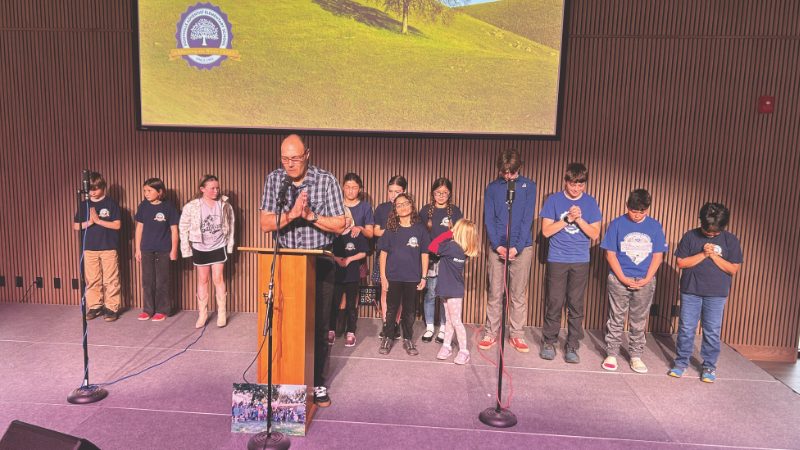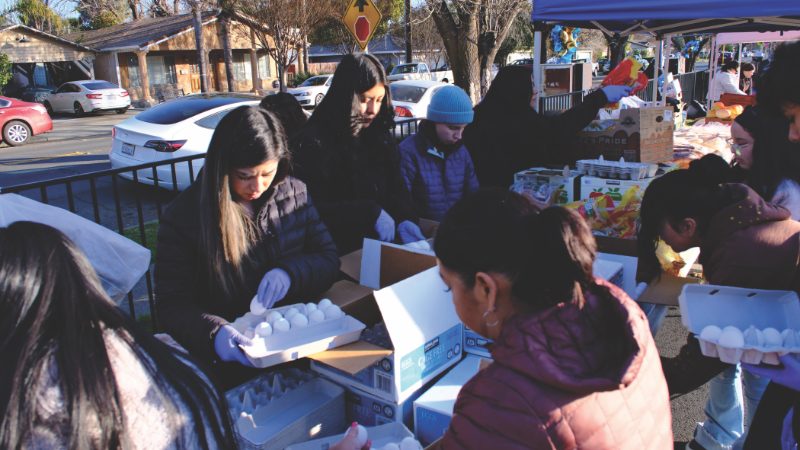Do you remember the time when…” That’s the preamble to most family stories—often recounting something embarrassing or surprising. My father was a great one for telling tales of growing up in the tiny town of Carterville in Southern Illinois. As a child, chasing the family’s pet chicken. Playing basketball with the high school team that went on to the regional finals. His mother making cornbread and beans for many meals because that’s what working poor people could afford. We heard how dad joined the Navy in World War II, was stationed on Guam, would go to college on the GI Bill and be the first one in family history to complete a four-year college degree (UCLA), and go on to marry the woman he sat next to in class. Like most families, these stories and so many more created the narrative of our identity as Newtons. Funny, sad, mundane, inspiring. It was all there.
Ellen White penned, “We have nothing to fear for the future, except as we shall forget the way the Lord has led us, and His teaching in our past history” (Christian Experience and Teachings of Ellen G. White, p. 204). Perhaps with me you have heard this quoted from pulpits, in board meetings, or in Adventist periodicals. This is a powerful promise written by the Lord’s messenger, one of the tested pioneers of this church. I note that it is a conditional promise though: “except as we shall forget the way the Lord has led us.” The threat facing us today is that we shall indeed forget. It’s not so much an intentional rejection as it is consistently choosing to displace and dispel our origin stories for the urgency of today’s problems. The irony is that this default takes us away from some of the very help we need for today.
Presidents of the United States since Ronald Reagan have periodically met with historians to find potential parallels in history to the challenges of the hour. In their loneliest hours while making agonizing decisions, they have sought guidance in reflecting upon what past American presidents did in crisis moments. In the spiritual realm, Moses commanded Israel to keep the story of their faith alive through retelling past experiences with the Lord. “Fix these words of mine in your hearts and minds; tie them as symbols on your hands and bind them on your foreheads. Teach them to your children, talking about them when you sit at home and when you walk along the road, when you lie down and when you get up. Write them on the doorframes of your houses and on your gates” (Deuteronomy 11:18-20, NIV). Both adults and children benefited from a consistent reminder of God’s working in their community.
How can you and I find strength and courage when facing the tests and uncertainties of life’s complexities? When you come up against decisions that can profoundly shape your future, is there help from God? Along with seeking the Lord in prayer for guidance and reading the timeless wisdom of Scripture, He has also provided practical means to speak to us from the past experiences of others. The book of Hebrews encourages us in this task, “Therefore we also, since we are surrounded by so great a cloud of witnesses, let us lay aside every weight, and the sin which so easily ensnares us, and let us run with endurance the race that is set before us” (Hebrews 12:1, NKJV). Scripture teaches a relationship between the “cloud of witnesses” (those who have come before us) and our increased capacity to live with greater integrity and hope today.

We have the opportunity today to very easily access the inspiring and instructive lives and experiences of people of faith who have journeyed before us. Solomon observed, “There is nothing new under the sun” (Ecclesiastes 1:9). As I read the sources available to us today, I am reminded that what I think is unique and special about my challenges in 2024 have been faced by others. Our own Seventh-day Adventist story and the people who lived it are fascinating, inspiring, challenging, and instructive for us now.

One of those stories is of Josephine Gotzian. She was first introduced to the Adventist message in the early 1880s, and soon she and her husband, a shoe and book manufacturer, were members of the St. Paul Seventh-day Adventist Church. Her husband, Adam, died when they were in a train crash in 1883, and after she recovered from a broken back, she found herself in possession of a sizable fortune. The rest of her life, she dedicated her resources to supporting creative ways to fund new ministry ventures for God’s work. This included providing loans to the denomination at crucial times when it needed money to keep the operations going. In modern parlance, she would be a venture capital source. The difference is that she wasn’t seeking to make money but rather to invest her assets for Jesus. She was a confidant of Ellen White, and she helped finance the establishing of Paradise Valley Sanitarium, St. Helena Sanitarium, and White Memorial Hospital (along with two other women), to name a few of her ventures.

Her amazing story in greater detail is readily available through the online Encyclopedia of Seventh-day Adventists. Here are hundreds of stories, events, and people that make up the “cloud of witnesses.” Quite often on Friday evening, I will go there to discover yet another new story that inspires and informs me of how God has been at work in our church and the people that He has used. But there are many other sources as well. Pacific Press has so many wonderful books in their Adventist history collection. Our own Pacific Union’s Oak and Acorn is publishing many great books that tell the story of our Church’s development.
As important as these are, we can also be reminded of God’s work in our own personal faith history. Many find that keeping a journal of answered prayers can be the reference point for future times when they face trials and setbacks and may feel discouraged. When you read what the Lord has done for you in the past, it will give you courage for what lies ahead. Taken together with our own Church’s story, we can move forward with confidence that the same Jesus who was with us before will take us through our current circumstances with love and grace.
_____________________________
Bradford C. Newton is the president of the Pacific Union Conference.
«Para que no se nos olvide»
Por Bradford C. Newton
¿Recuerdas cuando...?» Ese es el preámbulo de la mayoría de las historias familiares, a menudo contando algo vergonzoso o sorprendente. Mi padre era un gran aficionado a contar historias de su infancia en el pequeño pueblo de Carterville, en el sur de Illinois. De niño, persiguiendo al pollo mascota de la familia. Jugando baloncesto con el equipo de la escuela secundaria que llegó a las finales regionales. Su madre hacía pan de maíz y frijoles para muchas comidas porque eso era lo que la gente trabajadora pobre podía comer. Escuchamos cómo papá se unió a la Marina en la Segunda Guerra Mundial, estuvo estacionado en Guam, iría a la universidad con la Ley GI y sería el primero en la historia familiar en completar un título universitario de cuatro años (UCLA) y después se casaría con la mujer con la que se sentaba en clase. Como la mayoría de las familias, esas historias y muchas más crearon la narrativa de nuestra identidad como Newtons. Divertido, triste, mundano, inspirador. Todo estaba entremezclado.
Ellen White escribió: «No tenemos nada que temer del futuro, excepto que olvidemos la forma como el Señor nos ha guiado y su enseñanza en nuestra historia pasada» (Christian Experience and Teachings of Ellen G. White, pág. 204). Tal vez hayas oído eso desde los púlpitos, en las reuniones de la junta directiva o en las revistas adventistas. Esa es una impactante promesa escrita de la mensajera del Señor, uno de los pioneros de esta iglesia. Sin embargo, observo que es una promesa condicional: «a menos que olvidemos la forma como el Señor nos ha guiado». La advertencia a la que nos enfrentamos es que realmente olvidemos. No se trata tanto de un rechazo intencional como de la elección constante de desplazar y disipar nuestras historias de origen por la urgencia de los problemas actuales. La ironía es que ese incumplimiento nos aleja en parte de la ayuda que necesitamos.
Los presidentes de los Estados Unidos, desde Ronald Reagan, se han reunido periódicamente con historiadores para encontrar posibles paralelismos en la historia con los desafíos del momento. En sus horas más solitarias, mientras tomaban agonizantes decisiones, han buscado orientación para reflexionar sobre lo que hicieron los presidentes estadounidenses anteriores en momentos de crisis. En el ámbito espiritual, Moisés le ordenó a Israel que mantuviese viva la historia de su fe al volver a contar experiencias pasadas con el Señor. «Grábense estas palabras en el corazón y en la mente, átenlas en sus manos como un signo y llévenlas en su frente como una marca. Enséñenselas a sus hijos y háblenles de ellas cuando estén en su casa y cuando vayan por el camino, cuando se acuesten y cuando se levanten; escríbanlas en los postes de su casa y en los portones de sus ciudades» (Deuteronomio 11:18-20). Tanto los adultos como los niños se beneficiaban de un recordatorio constante de la obra de Dios en su comunidad.
¿Cómo podemos tu y yo encontrar fortaleza y valor al enfrentar las pruebas e incertidumbres de las complejidades de la vida? Cuando te enfrentas a decisiones que pueden moldear profundamente tu futuro ¿puedes contar con la ayuda del Señor? Además de buscar al Señor en oración para que te guíe y leer la sabiduría eterna de las Escrituras, él también ha proporcionado medios prácticos para hablarnos de las experiencias pasadas de otros. El libro de Hebreos nos anima en esa tarea: «Por tanto, también nosotros que estamos rodeados de una nube tan grande de testigos, despojémonos de todo peso y del pecado que nos asedia y corramos con perseverancia la carrera que tenemos por delante» (Hebreos 12:1). Las Escrituras enseñan una relación entre la «nube de testigos» (aquellos que nos han precedido) y nuestra mayor capacidad para vivir con mayor integridad y esperanza.

Tenemos la oportunidad de acceder muy fácilmente a las vidas y experiencias inspiradoras e instructivas de las personas de fe que ha habido antes que nosotros. Salomón observó: «No hay nada nuevo bajo el sol» (Eclesiastés 1:9). Al leer las fuentes disponibles, me encuentro con que lo que creo que es único y especial acerca de mis desafíos en 2024 lo han enfrentado otros. Nuestra misma historia adventista del séptimo día y las personas que la vivieron son fascinantes, inspiradoras, desafiantes e instructivas para nosotros.

Una de esas historias es la de Josephine Gotzian. Fue introducida por primera vez al mensaje adventista a principios de la década de 1880 y pronto ella y su esposo, un fabricante de zapatos y libros, eran miembros de St. Paul Seventh-day Adventist Church. Su esposo, Adam, murió cuando sufrieron un accidente de tren en 1883 y después de que ella se recuperó de una fractura en la espalda, se encontró en posesión de una fortuna considerable. El resto de su vida dedicó sus recursos para apoyar formas creativas de financiar nuevas empresas ministeriales para la obra de Dios. Eso incluyó la concesión de préstamos a la denominación en momentos cruciales en los que necesitaba fondos para mantener las operaciones en marcha. En el lenguaje moderno, ella sería una fuente de capital de riesgo. La diferencia es que ella no buscaba ganar dinero sino invertir sus bienes para Jesús. Fue confidente de Ellen White y ayudó a financiar el establecimiento de Paradise Valley Sanitarium, St. Helena Sanitarium, y White Memorial Hospital (junto con otras dos mujeres), por nombrar algunas de sus empresas.

Su increíble historia con mayor detalle está disponible a través de la página web de la Encyclopedia of Seventh-day Adventists. Hay ahí cientos de historias, eventos y personas que conforman la «nube de testigos». Muy a menudo, los viernes por la noche, voy ese sitio para descubrir otra nueva historia que me inspire e informe de cómo Dios ha estado obrando en nuestra iglesia y acerca de las personas que ha usado. Pero también hay muchas otras fuentes. Pacific Press tiene muchos libros maravillosos en su colección de historia adventista. Oak and Acorn, de nuestra propia Pacific Union, está publicando varios excelentes libros que cuentan la historia del desarrollo de nuestra Iglesia.
A pesar de lo importantes que son, también podemos recordar la obra de Dios en nuestra historia de fe personal. Muchos descubren que llevar un diario de oraciones contestadas puede ser el punto de referencia para tiempos futuros cuando se enfrenten a pruebas y reveses y se sientan desanimados. Cuando leas lo que el Señor ha hecho por ti en el pasado te dará valor para lo que te espera. Junto con la historia de nuestra Iglesia, podemos seguir adelante con la confianza de que el mismo Jesús estuvo con nosotros antes y nos llevará a través de nuestras circunstancias con amor y gracia.
_____________________________
Bradford C. Newton es el presidente de la Pacific Union Conference.






